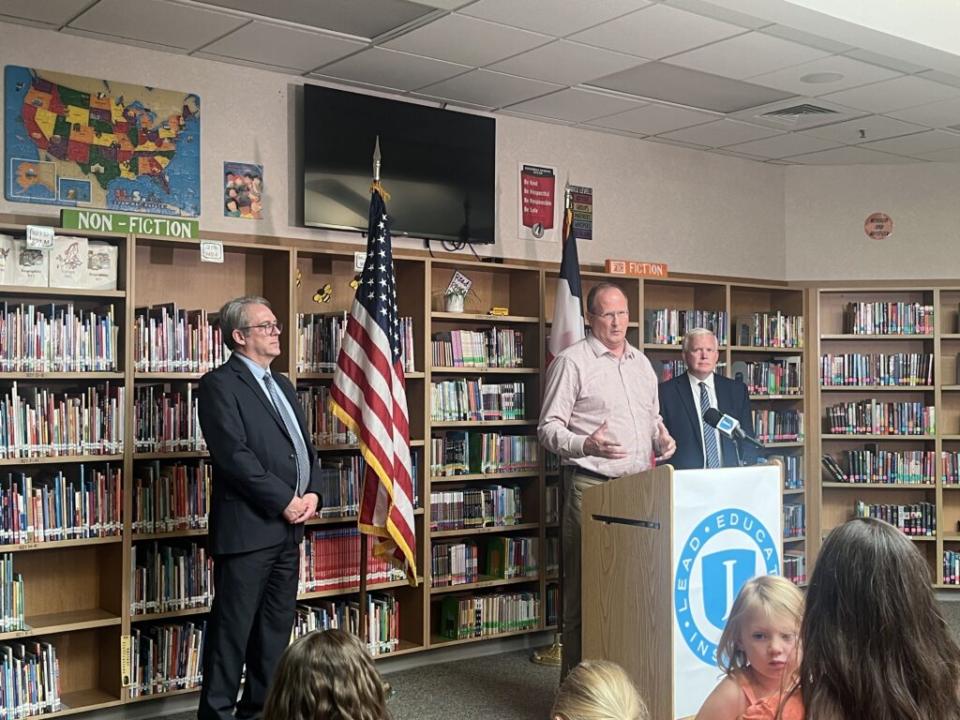Jordan School District leads lawsuit over social media’s mental health harms

- Oops!Something went wrong.Please try again later.
Tracy Miller, president of the Jordan School District Board of Education speaks on a news conference at Columbia Elementary School on July 29, 2024 (Alixel Cabrera/Utah News Dispatch)
The Jordan School District is joining a list of 12 leaders in a nationwide lawsuit against social media giants including Facebook, Instagram, Snapchat, TikTok and YouTube for what the district described as “negligence” and “public nuisance,” after its schools had to take on costs associated with students’ social media use.
Those extra costs, Tracy Miller, president of the Jordan School District Board of Education said at a library at the Columbia Elementary School in West Jordan, were to serve an increased need for student mental health services.
“Jordan School District has devoted substantial resources to addressing students and curating mental health and to combat learning disruptions. We are honored to be chosen as one of the lead plaintiffs, and are hopeful that this lawsuit will help us recoup some of our costs,” Miller said. “And, more importantly, change the way social media companies operate so our students are protected.
GET THE MORNING HEADLINES DELIVERED TO YOUR INBOX
The district also hopes to see change in the platforms to address their “addictive nature,” said Bryce Dunford, a Jordan School District Board of Education member.
“I would hope these companies would realize that they’re dealing with an addictive product and will, on their own, be more responsible with how they deal with that addictive product so it doesn’t harm people,” Dunford said.
In the case, filed last year in the Northern District of California’s U.S. District Court, the school district and other complainants argue that the platforms are defective and exploitative, fueling “an unprecedented mental health crisis” with their social media products, which they deem to be “addictive” and “dangerous.”
One of the suit’s claims is that social media companies have borrowed behavioral and neurobiological techniques used by other addictive industries, such as slot machines and the cigarette industry, to design features to maximize youth engagement.
Children and teens are more vulnerable to these tactics, the complaint reads, because their brains aren’t fully developed and “lack the same emotional maturity, impulse control, and psychological resiliency as adults.”
Let us know what you think...
According to the lawsuit, the companies provide an endless feed “to keep users scrolling in an induced ‘flow state,’” and reward extreme usage through metrics, graphics and incessant notifications. They also have “deficient tools for parents that create the illusion of control.”
“Today, over a third of 13- to 17-year-old kids report using one of Defendants’ apps ‘almost constantly’ and admit this is ‘too much.’ Yet more than half of these kids report that they would struggle to cut back on their social media use. Instead of feeding coins into machines, kids are feeding Defendants’ platforms with an endless supply of attention, time, and data,” according to the complaint.
The challenge links these trends with the rise of suicide rates and emergency room visits for anxiety.
“Plaintiffs are not merely the collateral damage of Defendants’ products,” the complaint reads. “They are the direct victims of the intentional product design choices made by each Defendant. They are the intended targets of the harmful features that pushed them into self-destructive feedback loops.”
The companies have filed a motion to dismiss the suit, citing the First Amendment, which “protects them from liability for the speech they publish as well as for all choices they have made in disseminating them.” according to court records. The court partially denied that motion, arguing that an “all or nothing” approach fails to acknowledge the complexity of the issues presented in the litigation.
Extra resources and research
Miller sees a reflection of the studies correlating social media use with anxiety, depression, sleep problems and lack of self-esteem in the Jordan School District halls. The district has allocated extra resources toward psychologists, counselors and other wellness programs to help students and teachers combat these issues, she said on Monday.
That has amounted to millions of dollars, Anthony Godfrey, the district’s superintendent said. However, the impact goes beyond those monetary resources, he said while choking up.
“You see on an individual basis how their lives are negatively impacted, not just their living, but their ability to interact with others and have a productive day of school is dramatically negatively impacted by social media,” Godfrey said.
Though school staff hours will be dedicated to the litigation, Godfrey said, there won’t be a substantial monetary investment in it. There may be costs associated with participating in in-person proceedings but, he argued, “that’s an investment in making that change.”
‘Both ends of the social media spectrum’
When Logan Dunford was a sophomore in high school, he deleted Instagram, Snapchat and TikTok from his phone.
“I began to feel really uncomfortable and awkward and kind of unsafe in my own skin throughout all situations of my life. And I thought that it was really important to somehow find a way to disconnect,” Dunford said on Monday. “And the easiest way to do that was going off social media.”
He’d spend more than 12 hours scrolling the apps, he said.
“I preferred TikTok the most because the short videos are so satisfying,” he said. “And it’s convenient to just watch to be focused on one thing and then move on to the next thing immediately.”
What he thought would be a week-long break, turned into an everlasting hiatus. Three years after that decision, Dunford, who is now 18 years old, aced his AP tests, is less distracted and is planning on majoring in environmental science at the University of Utah.
He stopped overthinking likes and direct messages, and started forging more in-person relationships. But, he still misses the sparks of serotonin the platforms provided.
“The small fact that people were seeing me was so addicting and it’s something that I still totally crave to this day,” he said. “But I recognize in the fact that I do still feel that way, should I get back on, I would be sucked right back into that toxic mentality that I had in the first place and I would be super depressed again and super anxious all the time.”
Logan has seen both ends of the social media spectrum, said his father Bryce Dunford, the Jordan District Board of Education member. As a parent, Bryce Dunford said, he has witnessed the “consuming power that comes over a young person who is not prepared to swim in those very difficult waters.” But also, the complete change that comes when a young person severs those ties.
“My wife and I will accept the responsibility for the choices we make for our children. We did get him a phone,” he said. “But we expect everyone that has an influence in the lives of our children to act responsibly, to do what’s in their best interest and not do anything that deliberately harms them.”


